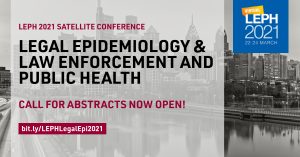
The Temple University Center for Public Health Law Research will convene a satellite conference in conjunction with the 2021 Global Law Enforcement and Public Health (LEPH) Conference in March 2021. This satellite conference, funded by the National Science Foundation Law and Science Program, is a global gathering of people whose work in public health law research (also known as legal epidemiology) informs practice and policy at the intersection of law enforcement and public health. The satellite will provide participants with an outlet to share their research, advance scholarship and methods, and support early-career and underrepresented scholars who are interested in studying the effects of criminal law and its enforcement on public health.
Conference Structure
Presentations will be recorded and provided to registrants in advance, with real-time discussions scheduled to coincide with the global LEPH Conference, March 22-26, 2021. Discussions will be moderated sessions, up to one hour long, dedicated to conversation and engaged interaction between attendees and presenters. Proceedings will be summarized in a presentation by the organizing committee at the LEPH conference.
Call for Abstracts
Legal epidemiology — the scientific study of law as a factor in the cause, distribution and prevention of disease and injury — is an emerging transdisciplinary field with roots in health, socio-legal and behavioral research. The intersection of law enforcement and public health encompasses both the obvious concerns and questions related to the interaction of law enforcement and communities, and broader questions about the effects of law and policy on security, safety, power, and control. It also asks how these issues interact with health, well-being and equity; all questions legal epidemiologists seek to answer.
The organizing committee is seeking abstracts from researchers who represent the breadth of scholarship in law enforcement and public health to support an innovative, interactive program that will foster conversation and engagement among attendees from a variety of disciplines. Sessions will focus on research sharing, development of research methods, and field building, with a special focus on early career and student researchers. The organizing committee seeks to build an intellectual environment that will bring empirical research into the conference’s largely practice-focused conversation.
Presentations should report on research, or address methods issues, in at least one of four areas of inquiry:
1. Measuring the effects of criminal law and law enforcement on the social determinants of health
There is much evidence that the key determinants of health inequities lie in the realms of politics and socio-economic processes and structures (WHO, 2008). Such factors include racism and discrimination, socioeconomic status (especially poverty and income inequality), and access to education and employment opportunities, neighborhood and physical environment, and marginalization and social
exclusion. While the impact of these factors on health status has been extensively studied, there has been much less attention paid to the role of criminalization – policy, law and enforcement – in creating or enhancing influences on health status and outcomes. An obvious example of a profound potential deleterious effect is of the impact of discriminatory laws and unjust law enforcements practices as drivers of marginalization and social exclusion – to the point of incarceration and its massive impact on health, both of individuals and communities (Drucker, 2011).
- Developing shared metrics to inform law enforcement and public health (LEPH) strategy and practice
Fundamental to effective partnerships between public health and law enforcement agencies is a shared understanding of goals and values; fundamental in turn to these are agreed-upon measures and processes of measurement to support evaluation of impact or policies. Of particular interest are opportunities for enhanced collaboration across the fields of legal epidemiology, social epidemiology and epidemiological criminology, including novel theories and tools to support legal mapping, policy surveillance, and the measurement of legal variables.
- Understanding people’s experiences of laws and legal practices and the effects on health
There is a general disjunction between the intentions of legal authorities and peoples’ experiences of policing, law enforcement, and justice involvement. A now well-established body of theory and evidence surrounding ‘procedural justice’ demonstrates that if people experience the actions of legal authorities as fair, transparent, and respectful, they are more likely to perceive legal institutions as legitimate and comply with their directives (Tyler, 1990). The application of this theoretical idea is analogous across the fields of criminal law and public health law (Tyler and Mentovich, 2013). Building on this foundation, researchers now recognize the need to trace the link between peoples’ experiences of law, and how these experiences effect their health and wellness. For example, people affected by serious mental illness, for instance, can experience justice involvement as uniquely stigmatizing (Watson and Angell, 2013), and the effects of such stigma on their help-seeking behavior and long-term recovery is not well understood. Policing actions that sex workers experience as abuse can exacerbate women’s exposure to client perpetrated violence (Footer et al., 2019). In efforts to avoid police detention, injection drug users caught up in the targeted enforcement of drug laws can reduce their own efforts to practice harm reduction (e.g., accessing clean needles or taking the time the inject in sanitary environments) (Cooper, Moore, Gruskin and Krieger, 2005). More recently, researchers have begun tracing the direct effects of aggressive and racist law enforcement on peoples’ mental and physical health (Geller et al., 2014). Much more work is required to describe the nature of peoples’ experiences of the law and trace the effects of these experiences on concrete health outcomes.
- The role of health law in promoting first responder health and wellness
Today, attention is finally being given to first responders’ well-being and resilience, and agencies are only now beginning to recognize the vulnerability of their own members, both during routine police work and in the management of public health emergencies and natural disasters (Adams & Anderson, 2019; Thorpe et al., 2015). As the connection is increasingly acknowledged, further research is needed to understand the conditions needed to enhance the resiliency of first responders, including laws and policies that facilitate preventive approaches to the wellness of officers and their families, and the challenges to first responder wellness and resilience.
Who Should Submit?
Any empirical researcher whose work focuses on the intersection of law enforcement and public health. The organizing committee actively encourages early career and student researchers (graduate, doctoral, and post-doctoral students) to submit.
Deadline and Submission Process
Abstracts should be no more than 400 words, and should articulate the following:
- Research question, area of inquiry addressed, and public health impact of the issue being researched
- Methods used
- Any findings available (preliminary findings are acceptable)
- Implications for policymaking, reform, or advancement of the field of LEPH
**Submit to by October 30, 2020 at 11:59 p.m. ET.
Using this Google Form
Please contact bethany.saxon@temple.edu with any questions.





